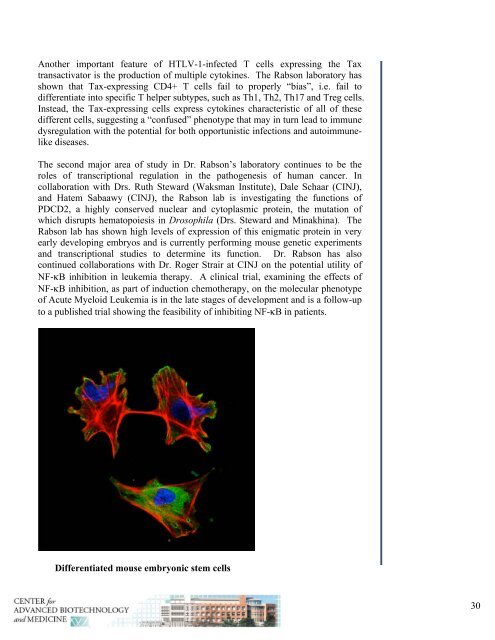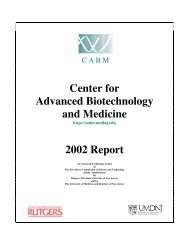Annual Report 2011 - Center for Advanced Biotechnology and ...
Annual Report 2011 - Center for Advanced Biotechnology and ...
Annual Report 2011 - Center for Advanced Biotechnology and ...
You also want an ePaper? Increase the reach of your titles
YUMPU automatically turns print PDFs into web optimized ePapers that Google loves.
Another important feature of HTLV-1-infected T cells expressing the Tax<br />
transactivator is the production of multiple cytokines. The Rabson laboratory has<br />
shown that Tax-expressing CD4+ T cells fail to properly “bias”, i.e. fail to<br />
differentiate into specific T helper subtypes, such as Th1, Th2, Th17 <strong>and</strong> Treg cells.<br />
Instead, the Tax-expressing cells express cytokines characteristic of all of these<br />
different cells, suggesting a “confused” phenotype that may in turn lead to immune<br />
dysregulation with the potential <strong>for</strong> both opportunistic infections <strong>and</strong> autoimmunelike<br />
diseases.<br />
The second major area of study in Dr. Rabson’s laboratory continues to be the<br />
roles of transcriptional regulation in the pathogenesis of human cancer. In<br />
collaboration with Drs. Ruth Steward (Waksman Institute), Dale Schaar (CINJ),<br />
<strong>and</strong> Hatem Sabaawy (CINJ), the Rabson lab is investigating the functions of<br />
PDCD2, a highly conserved nuclear <strong>and</strong> cytoplasmic protein, the mutation of<br />
which disrupts hematopoiesis in Drosophila (Drs. Steward <strong>and</strong> Minakhina). The<br />
Rabson lab has shown high levels of expression of this enigmatic protein in very<br />
early developing embryos <strong>and</strong> is currently per<strong>for</strong>ming mouse genetic experiments<br />
<strong>and</strong> transcriptional studies to determine its function. Dr. Rabson has also<br />
continued collaborations with Dr. Roger Strair at CINJ on the potential utility of<br />
NF-κB inhibition in leukemia therapy. A clinical trial, examining the effects of<br />
NF-κB inhibition, as part of induction chemotherapy, on the molecular phenotype<br />
of Acute Myeloid Leukemia is in the late stages of development <strong>and</strong> is a follow-up<br />
to a published trial showing the feasibility of inhibiting NF-κB in patients.<br />
Differentiated mouse embryonic stem cells<br />
30



